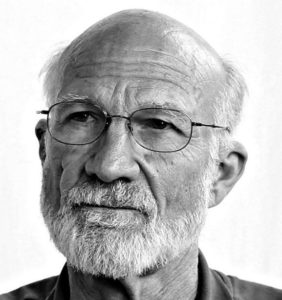Stanley Hauerwas, Theologian and Ethicist

Dates: 1940-present
Location: United States
Context: Stanley Hauerwas is an American Methodist theologian who is widely considered one of the most creative and influential Christian thinkers of the modern era. Hauerwas was born in Dallas, Texas, in 1940 and grew up in a working-class family. He was baptized, raised, and confirmed in the Methodist Church. Hauerwas completed his Bachelor of Arts at Southwestern University in Georgetown, Texas, then completed three master’s degrees and a PhD in theology at Yale University. He entered academia, teaching at Augustana College, University of Notre Dame, and Duke Divinity School. Hauerwas is the author or co-author of over 45 books, as well as countless articles and essays. Hauerwas is most well-known as an ethicist—a philosopher of ethics and morality. He has contributed to scholarly discussion of many modern ethical issues, including end of life care, just war theory, patriotism, scientific experimentation, and societal care for the poor. A controversial figure, he has polemicized both liberal Christianity and fundamentalism, both left-wing and right-wing Christian thought. He achieved notability outside the Christian theological world by appearing on the Oprah Winfrey Show. When TIME Magazine named him “America’s Best Theologian,” he responded, “Best is not a theological category.”
Excerpts from “What’s love got to do with it? The Politics of the Cross”
Nothing is more destructive to the Christian faith than the current identification of Christianity with love. If God wants us to be more loving, why do you need Jesus to tell us that? Why did God not just tell us through an appropriate spokesman (it could have been Jesus) that God wants us to love one another? God, in such a faith, becomes that great “OK” who tells us we are OK and, therefore, we are taught we should tell one another we are OK. But if Jesus is the proclamation of the great OK, why would anyone have bothered putting him to death? There must have been some terrible failure in communication.
When love becomes what Christianity is all about, we can make no sense of Jesus’s death and resurrection. Ask yourself: if that is what Jesus is all about – that is, getting us to love one another – then why did everyone reject him? The offense is not that Jesus wanted his followers to be loving – the offense is Jesus himself. Jesus is the politics of the new age. The gospel is the proclamation of a new age begun through the life, death and resurrection of Jesus Christ.
Is it any wonder that Jesus was despised and rejected? Is it any wonder that when the church is faithful to Christ that she finds herself persecuted and condemned? Yet if such a church does not exist, the world has no alternative to the violence hidden in our fear of one another. Such a savior does not promise that by being his follower we will be made safe. Rather, this savior offers to free us from our self-inflicted fears and anxieties. Jesus does so not by making our lives “more meaningful” – though we may discover our lives have renewed purpose – but by making us members of his body and blood so that we can share in the goods of a community that is an alternative to the world.
Discussion Questions:
- Do you agree with Hauerwas’ argument about the essence of Christianity being something other than “be more loving”? Why or why not?
- If Jesus is not the proclamation of the “Great OK,” what is he the proclamation of? What does Jesus say about us and to us?
- What fears or anxieties are holding you back from more fully loving God? From more fully loving others?
- In what ways is the Church, the Christian life, an “alternative to the world”?


Comments are closed.